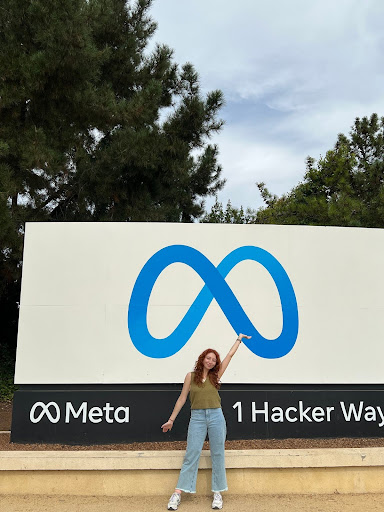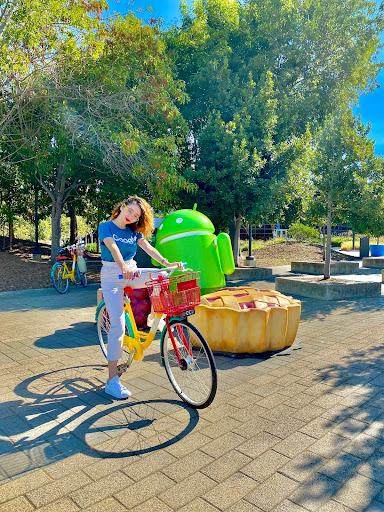WomenInTech. Inspiring success stories of Azerbaijani women shaping the IT industry

This article shares the stories of successful women — their journeys, challenges, and triumphs that inspire and motivate.
Nazrin Asgarzade, Edmonton, founder, Instagram, Facebook, LinkedIn
About me
I am a founder of the FemTech platform. I am a passionate ecosystem builder and community leader with a background in business and technology management. Over the past several years, I have organized and led startup programs, ideathons, and incubation initiatives — many of which focus on women’s empowerment and innovation. Today, I am pursuing my studies in Technology Management in Canada, while also continuing my work with the platform I launched called FemTech, which supports women in launching startups. I also work as a consultant, supporting research and programs at the intersection of gender equality, technology, and innovation.
My journey started with a deep passion for innovation, community building, and women’s empowerment. I studied World Economy at Baku Engineering University, and my early exposure to entrepreneurship came through international programs, including summer school at the IBA AMAN Center in Pakistan and the Global Job Skills, Employability, and Leadership program at the University of Applied Science Koblenz in Germany.
Professionally, I started as a program manager at SUP.VC, a corporate innovation company, where I organized programs that bridged the gap between corporates and startups. I gained hands-on experience through organizing startup weekends, startup grind events, hackathons. Later, I took on the role of managing director at Next Step Innovation Center, the first startup incubator in Azerbaijan, which has been operating since 2015. There, I led multiple regional incubation programs, collaborating with organizations like the Asian Development Bank and CAREC. I also had the opportunity to organize and host the CAREC Startup Bootcamp, working alongside Astana Hub and IT Park Uzbekistan, followed by a study tour exploring their ecosystems.
In 2023, I visited China as part of the CAREC Digital Tour, exploring the innovation hubs of Hangzhou, including Alibaba and HIKVision. More recently, I participated in the International Visitor Leadership Program in the U.S., where I met with incubators, startup founders, and women-led business organizations to exchange global best practices.
In 2020, I founded FemTech, a platform dedicated to supporting women in launching their startups and building tech careers. FemTech has received national recognition as “Tech Community of the Year” at the IDDA Awards, and has collaborated with global and local partners like UNFPA, USAID, UNDP, WomeninTech, Women Techmakers, Azerbaijani Women in Science, and many more to implement impactful programs such as hackathons, bootcamps, and incubation and development programs.
My career has evolved from economic and entrepreneurial foundations into a rich mix of innovation leadership, startup incubation programs, international collaboration, and technology management. Today, I am continuing my journey through further education in Technology Management in Canada, to bridge the gap between business and tech and better support emerging founders — especially women.

How I got into IT
My entry into IT was through my work with startups. While I did not start with a tech background, I worked closely with tech teams and saw the importance of understanding how technology shapes products and solutions. I became especially interested in FemTech — a platform to support early-stage female founders and empower women in tech. Wanting to contribute more meaningfully, I decided to strengthen my tech knowledge through formal education and continued learning. Now, I combine my business, communication, and organizational skills with a growing understanding of tech and innovation.

About stereotypes
As a woman leading startup programs — especially in regions where the tech industry remains male-dominated — I have often encountered subtle biases. Sometimes people assume that because I do not come from a technical background, I cannot lead innovation programs. But I have proven time and again that leadership, strategic thinking, and empathy are just as essential in the tech world. I have learned to turn those stereotypes into motivation to keep pushing boundaries, not just for myself, but for the women I mentor and support.
Obstacles for women in IT
Many women face challenges like lack of mentorship, imposter syndrome, or limited visibility in leadership roles. For me, one major barrier was the internal belief that I did not belong in tech because I did not code. But I realized that innovation needs diverse skills — product development, user understanding, strategic thinking — all areas where I could contribute. Surrounding myself with mentors, building communities like FemTech in Azerbaijan, and creating spaces where women support other women has been key. I believe in lifting others as we climb.

Recommendations for those who are just starting their journey
1. Do not wait to feel “ready” before jumping in. Whether it is tech, business, or innovation — start where you are and learn as you go. Your background does not limit you — your mindset does. I did not come from a tech background, but my curiosity and determination helped me grow into the space. Find your purpose, build your skills, and surround yourself with people who believe in your growth. Be curious, be bold, and never be afraid to create your own seat at the table. You do not have to fit into a mold — create your own story.
2. Find mentors and stay connected with them. Mentors can guide you, open doors, and help you see the bigger picture when you feel stuck. Throughout my journey, mentors have played a vital role — whether it was while building FemTech, managing incubation programs, or participating in international programs. Do not hesitate to reach out to people you admire and ask for advice or feedback. You would be surprised how many are willing to help.
3. Never stop learning. Make learning part of your daily routine. Whether it is reading, joining webinars, attending workshops, or enrolling in new programs — invest in yourself continuously. The tech and innovation world evolves fast, and staying curious and adaptable gives you a real edge. Even short courses or online communities can introduce you to new ideas that transform your thinking.
4. Network, network, network. Your network is a powerful asset. Attend events, connect with like-minded individuals, join communities, and do not shy away from conversations. Most of the opportunities I have had — whether international visits, partnerships, or speaker invitations — came from being active in the ecosystem. The more people know what you are passionate about, the more they’ll think of you when an opportunity comes up.
Nina Hamidli, San Francisco, data engineer, Instagram

About me
I am from Baku, Azerbaijan, and currently live in San Francisco, California. I am a Minerva University graduate with a dual degree — a B.S. in Computer Science and a B.A. in Arts & Literature — and I now build data pipelines and analytics systems as a Data Engineer at Meta. Beyond my day-to-day work, I stay energized through hiking, Pilates, yoga, and frequent travel. I also founded Girls in AI Azerbaijan, an initiative to broaden access to computer science and AI education for girls in my home country.
I came to the U.S. to earn my bachelor’s degree and arrived with wide-ranging interests — everything from biomedical engineering to literature. In my very first semester, I took an introductory programming course, signed up for a hackathon on a whim, and got hooked. Seeing a weekend idea turn into a working app convinced me that computer science is where creativity and problem-solving meet, and that was exactly what I wanted in a career.
From there, I immersed myself in hackathons, which pushed me to quickly learn new stacks, collaborate with diverse teams, and pitch under pressure. Those projects became talking points in most of my interviews.
Fun fact: one early win at HackHarvard even landed me the MacBook I coded on for the rest of university! I got my first software engineering internship through a win at TreeHacks @ Stanford University, so I am a huge advocate for attending hackathons and learning early on how to:
- Build projects in teams, and
- Network your way through the industry.
Hackathons served as the perfect testing ground, allowing me to switch between coding, data analysis, UI-design, and pitching. I realized I preferred backend development and did two infrastructure-focused software engineering internships to deepen that skill. While there, I was introduced to data infrastructure. After junior year, I did a data engineering course, got a data engineering internship and confirmed it was the right fit, and have stayed on that path ever since.
How I got into IT
I came to tech by way of the arts. I finished an arts school in Baku where I spent my time sculpting, woodworking, and painting, and assumed I would end up in a creative field that used physical materials. Once I reached university, though, I realised software could turn ideas into something tangible a lot faster and at global scale. My first hackathon made that obvious: in a weekend teams were turning half‑formed concepts into working products. The experience pushed me to learn to code, and from there I tested different roles through internships — graphic design, backend engineering, data work — at places like Google, Meta, Bill, startups and nonprofits. The data projects kept my attention the most; they mixed analytical depth, product understanding and the same problem‑solving instinct I would honed in the studio. After a junior‑year data-engineering internship at Meta I accepted a full‑time offer, and I am now a data engineer there.

About stereotypes
In my career, I have had very supportive mentors, managers and colleagues, so I have not been faced directly with stereotypes and have had a great support system.
But outside work, the first one I remember came in high school, when a teacher told the girls in class that learning informatics “wouldn’t be useful” for us. Later it became one reason I launched Girls in AI Azerbaijan, so future students would meet a different message, a message of encouragement.
Occasional remarks still pop up, such as “You must be drowning in job offers because you’re a woman.” Comments like that reduce years of study and preparation to a demographic box. But we should all be reminded that interviews are identical for every candidate, and our performance is measured against the same bar. I also try to redirect the conversation toward the work itself — results, code quality, data quality — because that is where credibility is built.
Overall, the support systems around me outweigh the noise, but those moments are a reminder that representation and clear standards matter. They motivate me to keep mentoring and to make sure the next generation hears “you belong here” instead.
Obstacles for women in IT
One challenge I have noticed early in my career is how visibility and assertiveness are rewarded, but judged differently depending on who’s speaking. In tech, making impact visible is essential for growth, yet women who communicate directly or promote their wins can be labeled as “abrasive”, while the same traits are praised in others. I treat visibility as a skill. I started sending detailed weekly updates to both my data engineering and product teams to share progress and priorities. It felt more like documenting than promoting but it worked. I also leaned on mentors for feedback about how I came across and how I could adjust without losing authenticity. Keeping records of measurable outcomes gave me, and others, solid proof of value that could speak louder than style.

Recommendations for those who are just starting their journey
1. My biggest advice is to explore widely, especially early on. Try out different roles, companies, and types of projects — whether through internships, clubs, or personal work. When you are new, you have the advantage of being able to ask questions freely and approach people without expectations. During my first internship, I set up informal chats with people across different departments, which helped me understand how broad and diverse the tech field really is. That is also how I found mentors who have guided me ever since.
2. Community matters just as much as skills. A big part of my growth came from being active in student groups and broader networks. Join clubs focused on your area of interest, and do not hesitate to get involved in global communities like Google WomenTechmakers, AnitaB.org, or WomenTechNetwork. These networks offer not just learning, but support, encouragement, and opportunities.
3. Finally, do not wait to feel “ready” to apply for roles. Start early, even if you do not get an offer right away. I began applying in my first year of university and did not land anything at first, but the experience helped me understand what was missing from my resume and how to improve in interviews. By my second year, I was much better prepared and started getting the roles I wanted. The same applies to building projects, get your hands dirty as early as you can. Start coding, experiment, and build things, even if they are small. It is the fastest way to learn, and those early projects often turn into great portfolio pieces or talking points in interviews. In a competitive field like tech, time and consistency are some of your best assets.
